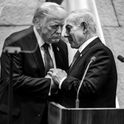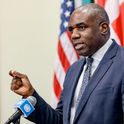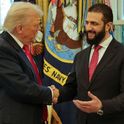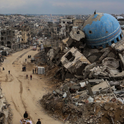A French helicopter lands on an American navy ship as part of the ongoing military operations in Libya
I have never been a fan of “liberal interventionism.” As a cameraman, I’ve seen it go wrong too many times in Iraq, Afghanistan and elsewhere. But a month in Tripoli changed my mind. I’m now convinced that what Libya needs—and needed right from the start—is the United Nations or the Arab League to put boots on the ground and finish the job.
Visiting Libya was a bit like taking a vacation with a dysfunctional family, where brother, sister and mum all conspire to hide the obvious: Dad is a creepy tyrant, not the all-knowing philosopher he pretends to be. Most dictators are happy to be feared and obeyed; Gaddafi needs to be adored. And his people, like beaten children grovelling before dad, comply. Grown men feel obliged to tell you they would “die for him.” Women repeatedly screech, “I love Gaddafi.” The first segment (and the second, and the third and sometimes the fourth) on the evening news report always featured a rally somewhere in Libya as citizens extravagantly proclaim their love, admiration, and devotion for the Brother Leader.
Every once in a while the illusion dissolved. One man whispered, “Don’t believe their lies”; another, making sure no one could hear, told me “We all hate him.” A boy who had been chanting regime slogans looked me straight in the eye and mouthed the word: “Freedom.” I saw regime thugs beating a man standing in silent protest; a taxi driver who took me to an opposition neighbourhood was imprisoned for weeks; I’ve had an AK-47 shoved in my side and colleagues have told me they have been pistol whipped and threatened with death.
Yet Gaddafi is not mad. No one singlehandedly rules a nation for 41years without preternatural shrewdness. Meeting him behind three sets of walls at his Tripoli fortress the Bab al Azizia, I was impressed with his charisma, his self-confidence, the awe he commands from everyone he encounters. Dressed in his traditional brown bedouin outfit, he giggled about the uprising, telling me in English "There is no crisis, this is a little event." Gaddafi insisted, against all evidence, he is not in control, that the masses rule his country. "The system in libya is based on the peoples authority on the people congresses on the peoples committes. How can we topple the people?” This makes him more dangerous. Unlike the Tunisian or Egyptian leaders, he has no red line for violence.
It was very clear what was at stake in early March, when Gaddafi’s forces were on the outskirts of rebel-held Benghazi. Had the city been taken, hundreds if not thousands of people would have been taken into custody, tortured and killed, and it might well have been the end of the Arab spring.
America’s leaders were understandably hesitant to get involved: given recent history, there was precious little appetite for becoming enmeshed in another war in the Muslim world, and Libya is largely irrelevant to US interests. The lesson from Iraq, that intervention is fraught with dangers and that success looks easier going in than coming out, cannot be so quickly forgotten.
Yet while the initial coalition bombing did prevent the slaughter of innocents in Benghazi, it also created a stalemate. Unlike the Northern Alliance in Afghanistan in 2001, the Shebab were too disorganized to leverage western bombing to take and hold territory. Nor could Tripoli rise up to overthrow the government.
It would only have taken a small number of boots on the ground to change the game. By international standards, Gaddafi’s army has proved itself ineffectual: good at slaughtering the unarmed, but not so much at war with an actual opponent. When Gaddafi attacked Egypt, in 1977, it took only three days for the Egyptian army to teach him a lesson. The west feared that putting in ground troops will sink us into a quagmire, but Libya is not Afghanistan, neither in geography nor in fighting mettle. Mountainous Afghanistan is an insurgent’s paradise: no wonder no government has ever been able to impose real control further than the ring road connecting the four major cities. Flat Libya, by contrast, is much more easily dominated from the centre.
Those in western states rightly ask why should we risk the life of a man from Hull or Mississippi to save the life of a man from Benghazi or Misrata. America’s reluctance to fight is a harbinger of its return to its traditional isolationism. It can no longer afford its role as world’s policeman, nor do its people crave the glory. Dead Americans in Sirte will not improve Obama’s re-election prospects. The world may miss the Pax Americana; Americans won’t.
But this doesn’t mean that outsiders cannot—or should not—commit troops on the ground. In a perfect world, the Arab League would do this, but it has showed little desire. The long-range answer, obvious if unlikely, is that the blue hats of the UN should become a real fighting force, with a stronger mandate and more permissive rules of engagement. Five thousand UN soldiers, willing to use their weapons, would most likely have prevented the slaughter of 800,000 Rwandans. In our emerging multipolar world, police actions cannot be the responsibility of some western “coalition of the willing” but instead of the civilized world as a whole. If we make these interventions more effective, in time they may become less necessary.
The Libyan government spokesman, Musa Ibrahim, has protested that the UN no fly zone amounts to intervening in domestic affairs, violating the sacred principle of national sovereignty. But not so long ago, here in Britain, a man could beat his wife and neighbours might cluck but the state would do nothing. The sanctity of the home meant the patriarch had free reign. We eventually came to realise this was unacceptable; so we changed the rules. It is not so different with nation states. Intervention in Libya is not “blood for oil” or a colonialist grab for North African territory. It is the international equivalent of calling the cops when your neighbour is whipping his children—and the UN, not the US, should be the force to respond.
I have never been a fan of “liberal interventionism.” As a cameraman, I’ve seen it go wrong too many times in Iraq, Afghanistan and elsewhere. But a month in Tripoli changed my mind. I’m now convinced that what Libya needs—and needed right from the start—is the United Nations or the Arab League to put boots on the ground and finish the job.
Visiting Libya was a bit like taking a vacation with a dysfunctional family, where brother, sister and mum all conspire to hide the obvious: Dad is a creepy tyrant, not the all-knowing philosopher he pretends to be. Most dictators are happy to be feared and obeyed; Gaddafi needs to be adored. And his people, like beaten children grovelling before dad, comply. Grown men feel obliged to tell you they would “die for him.” Women repeatedly screech, “I love Gaddafi.” The first segment (and the second, and the third and sometimes the fourth) on the evening news report always featured a rally somewhere in Libya as citizens extravagantly proclaim their love, admiration, and devotion for the Brother Leader.
Every once in a while the illusion dissolved. One man whispered, “Don’t believe their lies”; another, making sure no one could hear, told me “We all hate him.” A boy who had been chanting regime slogans looked me straight in the eye and mouthed the word: “Freedom.” I saw regime thugs beating a man standing in silent protest; a taxi driver who took me to an opposition neighbourhood was imprisoned for weeks; I’ve had an AK-47 shoved in my side and colleagues have told me they have been pistol whipped and threatened with death.
Yet Gaddafi is not mad. No one singlehandedly rules a nation for 41years without preternatural shrewdness. Meeting him behind three sets of walls at his Tripoli fortress the Bab al Azizia, I was impressed with his charisma, his self-confidence, the awe he commands from everyone he encounters. Dressed in his traditional brown bedouin outfit, he giggled about the uprising, telling me in English "There is no crisis, this is a little event." Gaddafi insisted, against all evidence, he is not in control, that the masses rule his country. "The system in libya is based on the peoples authority on the people congresses on the peoples committes. How can we topple the people?” This makes him more dangerous. Unlike the Tunisian or Egyptian leaders, he has no red line for violence.
It was very clear what was at stake in early March, when Gaddafi’s forces were on the outskirts of rebel-held Benghazi. Had the city been taken, hundreds if not thousands of people would have been taken into custody, tortured and killed, and it might well have been the end of the Arab spring.
America’s leaders were understandably hesitant to get involved: given recent history, there was precious little appetite for becoming enmeshed in another war in the Muslim world, and Libya is largely irrelevant to US interests. The lesson from Iraq, that intervention is fraught with dangers and that success looks easier going in than coming out, cannot be so quickly forgotten.
Yet while the initial coalition bombing did prevent the slaughter of innocents in Benghazi, it also created a stalemate. Unlike the Northern Alliance in Afghanistan in 2001, the Shebab were too disorganized to leverage western bombing to take and hold territory. Nor could Tripoli rise up to overthrow the government.
It would only have taken a small number of boots on the ground to change the game. By international standards, Gaddafi’s army has proved itself ineffectual: good at slaughtering the unarmed, but not so much at war with an actual opponent. When Gaddafi attacked Egypt, in 1977, it took only three days for the Egyptian army to teach him a lesson. The west feared that putting in ground troops will sink us into a quagmire, but Libya is not Afghanistan, neither in geography nor in fighting mettle. Mountainous Afghanistan is an insurgent’s paradise: no wonder no government has ever been able to impose real control further than the ring road connecting the four major cities. Flat Libya, by contrast, is much more easily dominated from the centre.
Those in western states rightly ask why should we risk the life of a man from Hull or Mississippi to save the life of a man from Benghazi or Misrata. America’s reluctance to fight is a harbinger of its return to its traditional isolationism. It can no longer afford its role as world’s policeman, nor do its people crave the glory. Dead Americans in Sirte will not improve Obama’s re-election prospects. The world may miss the Pax Americana; Americans won’t.
But this doesn’t mean that outsiders cannot—or should not—commit troops on the ground. In a perfect world, the Arab League would do this, but it has showed little desire. The long-range answer, obvious if unlikely, is that the blue hats of the UN should become a real fighting force, with a stronger mandate and more permissive rules of engagement. Five thousand UN soldiers, willing to use their weapons, would most likely have prevented the slaughter of 800,000 Rwandans. In our emerging multipolar world, police actions cannot be the responsibility of some western “coalition of the willing” but instead of the civilized world as a whole. If we make these interventions more effective, in time they may become less necessary.
The Libyan government spokesman, Musa Ibrahim, has protested that the UN no fly zone amounts to intervening in domestic affairs, violating the sacred principle of national sovereignty. But not so long ago, here in Britain, a man could beat his wife and neighbours might cluck but the state would do nothing. The sanctity of the home meant the patriarch had free reign. We eventually came to realise this was unacceptable; so we changed the rules. It is not so different with nation states. Intervention in Libya is not “blood for oil” or a colonialist grab for North African territory. It is the international equivalent of calling the cops when your neighbour is whipping his children—and the UN, not the US, should be the force to respond.












